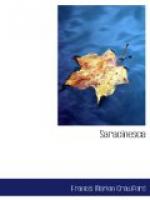On the following morning, Corona alone entered her carriage and was driven many miles up the southward hills, till the road was joined by a broad bridle-path that led eastwards towards the Abruzzi. Here she was met by a party of horsemen, her own guardiani, or forest-keepers, as they are called, in rough dark-blue coats and leathern gaiters. Each man wore upon his breast a round plate of chiselled silver, bearing the arms of the Astrardente; each had a long rifle slung behind him, and carried a holster at the bow of his huge saddle. A couple of sturdy black-browed peasants held a mule by the bridle, heavily caparisoned in the old fashion, under a great red velvet Spanish saddle, with long tarnished trappings that had once been embroidered with silver. A little knot of peasants and ragged boys stood all around watching the preparations with interest, and commenting audibly upon the beauty of the great lady.
Corona mounted from a stone by the wayside, and the young men led her beast up the path. She smiled to herself, for she had never done such a thing before, but she was not uneasy in the company of her rough-looking escort. She knew well enough that she was as safe with them as in her own house.
As the bridle-path wound up from the road, the country grew more rugged, the vegetation more scanty, and the stones more plentiful. It was a wilderness of rocky desolation; as far as one could see there was no sign of humanity, not a soul upon the solitary road, not a living thing upon the desolate hills that rose on either side in jagged points to the sky. Corona talked a little with the head-keeper who rode beside her with a slack rein, letting his small mountain horse pick its own way over the rough path. He told her that few people ever passed that way. It was the short road to Saracinesca. The princes sometimes sent their carriage round by the longer way and rode over the hills; and in the vintage-time there was some traffic, as many of the smaller peasants carried grapes across the pass to the larger wine-presses, and sold them outright. It was not a dangerous road, for the very reason that it was so unfrequented. The Duchessa explained that she only wanted to see the valley beyond from the summit of the pass, and would then return. It was past mid-day when the party reached the highest point,—a depression between the crags just wide enough to admit one loaded mule. The keeper said she could see Saracinesca from the end of the narrow way, before the descent began. She uttered an exclamation of surprise as she reached the spot.
Scarcely a quarter of a mile to the right, at the extremity of a broad hill-road, she saw the huge towers of Saracinesca, grey and storm-beaten, rising out of a thick wood. The whole intervening space—and indeed the whole deep valley as far as she could see—was an unbroken forest of chestnut-trees. Here and there below the castle the houses of the town showed their tiled gables, but the mass of the buildings was hidden completely from sight. Corona had had no idea that she should find herself so near to the place, and she was seized with a sudden fear lest Giovanni should appear upon the long straight path that led into the trees. She drew back a little among her followers.




